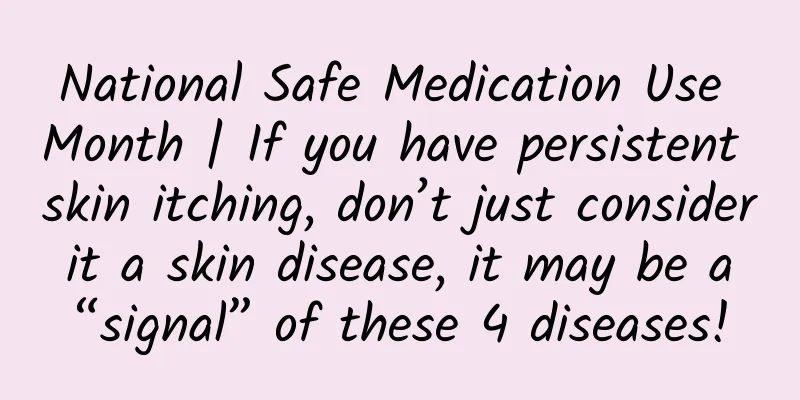National Safe Medication Use Month | If you have persistent skin itching, don’t just consider it a skin disease, it may be a “signal” of these 4 diseases!

|
In autumn and winter, many people feel that their skin becomes particularly dry and itchy, and the first thing that comes to mind is often skin diseases such as dermatitis. In fact, when scratching doesn't work and anti-itching ointments can't relieve it, these symptoms are probably not caused by skin diseases, but "signals" of some other diseases. Today, please follow Yaowa to identify the skin itching "signals" sent by 4 diseases. diabetes Itching symptoms Pruritus may occur throughout the body or locally (most commonly in the vulva and anus, followed by the back and lower limbs), and is more severe at night, and may be accompanied by paresthesia or decreased sensation. Pathogenesis High blood sugar: directly stimulates the peripheral nerves of the skin and causes itching, or puts the skin in a state of chronic dehydration, resulting in reduced secretion of sebaceous glands and sweat glands, and excessive dryness and itching of the skin. Peripheral neuropathy: abnormal nerve response and disordered signal transmission, leading to dry skin, itching or rash, etc. Prevention and control measures Regularly use hypoglycemic drugs to strictly control blood sugar and reduce blood sugar fluctuations. It is recommended to control blood sugar to <6.1 mmol/L when fasting and <7.8 mmol/L 2 hours after a meal. For diabetic patients who may have peripheral neuropathy, methylcobalamin or B vitamin supplements can be given to nourish the nerves as appropriate. To relieve itching symptomatically, you can apply moisturizer or anti-itch cream externally; for skin infections, you can use antibacterial or fungal preparations under the guidance of a doctor to control the infection; those with severe itching can take oral anti-allergic drugs. Liver disease Itching symptoms Systemic, with the itching most intense on the limbs (most closely matching the palms and soles), aggravated in the evening and at night, with no primary skin lesions, and not relieved by scratching. Due to liver disease, bile secretion is impaired and congestion occurs. When bile salts circulate throughout the body through the blood and are deposited in the skin, they stimulate the sensory nerve endings in the skin and cause itching all over the body. Prevention and control measures Pay attention to skin moisturizing, shower with warm water, but avoid using alkaline bath products such as soap. Avoid spicy food. Cholestyramine can be used to improve cholestasis. Anti-allergic drugs can be used to improve the condition (such as loratadine, cetirizine, etc.). Uremia Itching symptoms Symmetrical, intermittent itching over a large area is common and worsens at night and may last for months to years. Restricting water intake and the atrophy of sebaceous glands and sweat glands weaken the skin's sweat secretion function, leading to dry skin and itching (especially obvious at the end of dialysis). The accumulation of toxins and their transdermal metabolism attach to the skin surface and cause itching. Calcium and phosphorus metabolism disorders (high phosphorus and low calcium state) and secondary hyperparathyroidism further aggravate the deposition of calcium and phosphorus in the skin, inducing itching. Adjust the dietary structure to ensure adequate protein and calories, and a low-phosphorus diet. Perform hemodialysis regularly to remove toxins from the blood. Strengthen skin cleansing and moisturizing, remove dirt and dead skin on the skin surface. You can use Vaseline, vitamin E lotion, etc. to relieve the symptoms. Tumor Itching symptoms The main symptom is persistent itching, accompanied by changes in skin characteristics. The itching can be persistent or temporary, localized or widespread, and the symptoms vary. It is particularly important to note that localized skin itching often indicates tumors in nearby areas, such as perianal itching (possibly colorectal cancer), vulvar itching (possibly cervical cancer), and nasal itching (possibly brain tumors). Pathogenesis It may be related to the fact that cancer cells or cell debris act on the body to cause an immune response, which further releases itch-causing mediators (such as histamine, active factors, etc.). Prevention and control measures Actively treat the primary tumor. Glucocorticoids can be used to relieve tumor-related pruritus. It should be noted that antihistamines are ineffective in treating tumor-related pruritus. Skin itching is not a trivial matter. In the face of stubborn skin itching, in addition to excluding skin diseases, it is necessary to actively identify the cause of itching; strengthen protection, avoid factors that induce or aggravate itching, control scratching behavior, and reduce skin infections; see a doctor as soon as possible, and use drugs under the guidance of a doctor to treat the symptoms to avoid delaying the disease. |
<<: Will washing your hair frequently damage your hair and cause it to fall out?
>>: If a child is sick, should he or she take antibiotics?
Recommend
Clinical symptoms of mammary gland hyperplasia
Breast disease is a problem that many women in mo...
Why is there blood in the discharge?
For female friends, secretions are liquids that f...
Caesarean section second pregnancy incision itching
When a woman has a cesarean section, scars will a...
What causes swelling inside the vagina?
Many women are still relatively traditional. They...
Pregnant women's pubic bone position diagram
On the inner side of the transition between the u...
What are the indicators of fetal ultrasound at 39 weeks of pregnancy?
Pregnant women should go to the hospital for colo...
What causes breast pain during lactation?
A woman's breasts are a very important organ ...
Can women take weight loss pills during menstruation?
Menarche is generally considered to be a sign of ...
How long to rest after uterine polyp surgery
Uterine polyps are not unfamiliar to many women, ...
Cold hands and feet in women indicate kidney yang deficiency
Kidney yang deficiency will cause soreness in the...
What are the dangers of frequent sexual activity for women?
If a woman has sexual intercourse multiple times ...
Are your eyes healthy? New research shows: Heartbeat can measure eye health!
The heartbeat can be used to measure not only the...
What are the characteristics of beef noodles? How to make beef noodles
Beef noodles are characterized by soft and tender...
How to choose the treatment method for renal amyloidosis? Can it be cured?
Author: Liu Gang, Chief Physician, Peking Univers...









